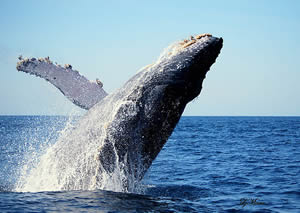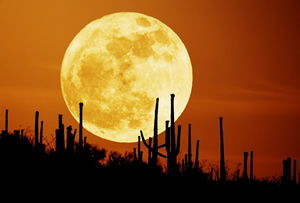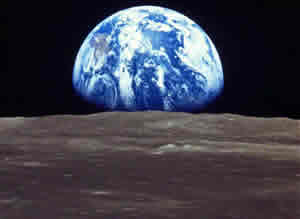Between Nature and Grace
For Sunday October 4, 2009
Lectionary Readings (Revised Common Lectionary, Year B)
Job 1:1, 2:1–10 or Genesis 2:18–24
Psalm 26 or Psalm 8
Hebrews 1:1–4, 2:5–12
Mark 10:2–16
This morning I stumbled out of bed a little before 5:00 AM and began the day like I do each and every day. I slipped into my Uggs, walked down the hallway, then let our dog Abby out the back door for her morning rituals. The air was cool despite record hot days. All was quiet in the neighborhood. The ink black sky hadn't yet given way to morning light. Venus sparkled in the southern sky, accompanied by thousands of twinkling stars.
I felt like the psalmist of three thousand years ago:
Lord, when I look at your heavens, the work of your fingers,
The moon and the stars that you have established;
What are human beings that you are mindful of them,
Mortals that you care for them?
Yet you have made them a little lower than God, and crowned them with glory and honor.
You have given them dominion over the works of your hands;
You have put all things under their feet,
All sheep and oxen,
And also the beasts of the field,
The birds of the air and the fish of the sea,
Whatever passes along the paths of the sea (Psalm 8, NRSV).
The magnitude and magnificence of creation witness to our human insignificance. And yet human beings, and only human beings, enjoy a divine dignity as care givers of creation. "Oh, the grandeur and littleness," exclaimed Pascal, "the excellence and the corruption, the majesty and meanness of man!" We might be mere reeds, he said, but we're thinking reeds. And oddly enough, it's precisely in acknowledging rather than denying our contradictions that human happiness rests.
 |
Breaching whale. |
The last few weeks I've been rereading the desert monastics of third and fourth century Egypt. They devoted their lives to listening to the voice of human experience, filtered through holy Scripture, and tested by the traditions of their predecessors. Just what did they find when they fled to the vast and lonely interior of the Egyptian desert? They experienced a raging battle in the geography of the heart. John Chryssavgis calls this a "spirituality of imperfection" that might be thought of as a sustained effort to discover what Paul meant in Romans 7:7–25. Created to bear the image of God, we struggle with a wide variety of contrary impulses.
Germanus, for example, asks his elder: "Why is it, that superfluous thoughts insinuate themselves into us so subtly and hiddenly when we do not even want them, and indeed do not even know of them, that it is very difficult not only to cast them out but even to understand them and to catch hold of them?" And that's only the beginning of the battle for wholeness of the heart. These Christian eccentrics exhibit a remarkable candor, "without any obfuscating embarrassment," that does not in the least "despise anyone in belittling fashion" for their failure and frailty.
Here's a quick list of some monastic maladies that I underlined from The Conferences of John Cassian (c. 360–c 435) — sleeplessness, vile dreams, impulsive urges, seething emotions, foolish fantasies, pious pretense that masks as virtue, clerical ambition, pernicious despair, confusion, wild mood swings, flattery, and lust. The list is almost endless, and these are only those symptoms of ill health we know. In addition to these, "there are many things that lie hidden in my conscience which are known and manifest to God, even though they may be unknown and obscure to me." Freud had nothing on these wise counselors.
Paradox and humor are always close at hand in monastic literature. Why is it, Cassian wonders, that a monk can renounce great wealth, then exhibit intense possessiveness and anger over a pen knife, a needle, a basket, a blanket, or a book? The desert ascetics were brutally realistic about our human condition, and unfailingly tender because of it. Nor were they hopeless, but confident that we can make progress through vigilance and trust in God's grace, even though, paradoxically, the more mature you become the wiser you are regarding your own many failures. "We are," writes Cassian, "only human beings."
The New Testament reading this week from the book of Hebrews affirms that wherever we find ourselves, God speaks to us "at many times and in various ways." Maybe he speaks to us through a book, a film, a friend, a song, perhaps a dream (cf. the many dreams in Scripture), a work of art or nature. He certainly speaks to many people through the glories of creation.
 |
Saguaro moon. |
Ultimately, though, God reveals himself most fully in Jesus: "The Son is the radiance of God's glory and the exact representation of his being." To demonstrate the deepest heart of God, Jesus shared humanity's flesh and blood. He was made like us in every respect, he suffered like we do, he prayed with "loud cries and tears," and died a violent death. In that death he "tasted death for everyone," and in some mysterious way "destroyed him who holds the power of death—that is, the devil—and freed those who all their lives were held in slavery by their fear of death." Conquering sin, death and the devil is, in fact, a convenient shorthand for who Jesus was and what he did. Mercy, empathy, and compassion (literally, "suffering with") thus characterize the God we worship (Hebrews 1:1–4, 2:5–18, 4:14–5:10).
The pastor and poet George Herbert (1593–1633) wrote a poem about our many human contradictions and the even greater mercy of God. In Affliction (IV) he pictures humanity as caught in the awkward space between human nature and divine grace.
Broken in pieces all asunder,
Lord, hunt me not,
A thing forgot,
Once a poor creature, now a wonder,
A wonder tortur’d in the space
Betwixt this world and that of grace.My thoughts are all a case of knives,
Wounding my heart
With scatter’d smart,
As wat’ring pots give flowers their lives.
Nothing their fury can control,
While they do wound and prick my soul.All my attendants are at strife,
Quitting their place
Unto my face:
Nothing performs the task of life:
The elements are let loose to fight,
And while I live, try out their right.Oh help, my God! let not their plot
Kill them and me,
And also thee,
Who art my life: dissolve the knot,
As the sun scatters by his light
All the rebellions of the night.Then shall those powers, which work for grief,
Enter thy pay,
And day by day
Labour thy praise, and my relief;
With care and courage building me,
Till I reach heav’n, and much more, thee.
Herbert's poetry reflects his lifelong struggle between his privileged background and worldly ambitions as a Member of Parliament and the Cambridge University faculty, and his choice to live as a poor country cleric in rural England. Like the psalmist, Pascal, and the early desert fathers, he knew from his own experience that human frailty abounds; but he also knew that divine grace abounds all the more.
 |
Earthrise. |
For further reflection
* What do you make of David's psalm: "Vindicate me, Lord, for I have led a blameless life" (Psalm 26)
* How and why have some Christians gained a reputation as "holier-than-thou?"
* How can the appeal to human paradox and contradiction become an excuse or rationalization?
* See John Chryssavgis, In the Heart of the Desert; The Spirituality of the Desert Fathers and Mothers (Bloomington: World Wisdom, 2003).
Image credits: (1) Redbubble.net; (2) Astronomy Picture of the Day, NASA; and (3) Dept. of Economics and Geography, Texas Tech University.





